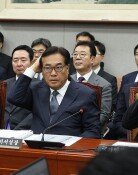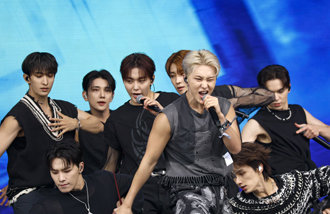Parks economic team trying to dodge criticism
Parks economic team trying to dodge criticism
Posted September. 06, 2013 05:12,
Shin Je-yoon, the chairman of the Financial Services Commission, majored in economics at Seoul National University and earned a masters degree in economics at Cornell University. He has such an excellent academic background but is the least educated in the economic team of the Park Geun-hye administration. All members of the economic team deputy prime minister, senior Presidential secretary for economic affairs, governor of the Bank of Korea, chairman of the Fair Trade Commission, Trade, Industry and Energy minister, Land, Infrastructure, and Transportation minister, Science, ICT, and Future Planning minister, Agriculture, Food, and Rural Affairs minister, and Oceans and Fisheries minister have a Ph.D. An academic background is not everything but the current economic team have the best expertise.
At a glance, it seems to have worked hard. It promptly released the housing market measures on April 1 only within 35 days from the launch of the Park administration. It made the additional budget bill pass the National Assembly without a compromise in early May. It also successfully released debt write-off policy, which has the risk of encouraging moral hazard and shake the financial system.
Despite such achievements, the economic team is not popular. It managed to avoid flunking. The Dong-A Ilbo surveyed 20 economic experts and they gave the team only 61 points out of 100. Worse, many people say in unison, I dont know if there is an economic team ever.
The economic team has no presence because they are too much conscious about being blamed and avoid it. It picks issues with clear-cut answers and selects things that they can avoid finger-pointing by loud groups like opposition parties or some civic groups. It is particularly cautious about what it is supposed to do immediately to help Korea survive in the tough global competition: easing regulations in the service industry and the Seoul metropolitan area, and block populism. It cannot have presence because it beats around the bush.
The measures on the service industry, which were released by ministries including the Strategy and Finance Ministry in early July, shows how badly the economic team wants to avoid criticism. Deregulation in the service sector is urgently needed to help Korea get out of the loop of growth without job creation. However, the government eliminated a few minor regulations, not even thinking about removing major regulations that hamper the service sector. Deputy Prime Minister Hyun Oh-seok made an excuse, saying, Its because there are plenty of cases that have conflicting interests.
Hyun also cited a four-letter proverb Su Jeok Cheon Seok meaning raindrops can penetrate a rock, implying that he would do little by little without making noises. The proverb pairs with Seung Geo Mok Dan (cutting wood with a straw rope), which refers to an attitude required to those who leave the secular world and cultivate themselves spiritually like monks.
Can the economic team dodge criticism if it acts like monks? Dhammapada has an episode like this.
A group of believers visited the noble and wise students of Buddha and asked for their teaching. Rewata, who Buddha called him the best among those who cultivate themselves spiritually in the woods, sat and said nothing. Sariputra, known for being wisest, gave a detailed theoretical teaching. Ananda who valued listening briefly gave them a summary. Believers, however, complained about all of their teachings.
Buddha said, People criticize you when you sit without a word. They blame you when you talk too much. They also criticize you when you say only a few words. No one cannot be free from criticism in the world.
The economic team should give up the idea that it can work without getting criticism from opposition parties or others. It can be an economic team that is not heavily criticized if it pushes for what it has to do to revive the economy despite some criticism.







